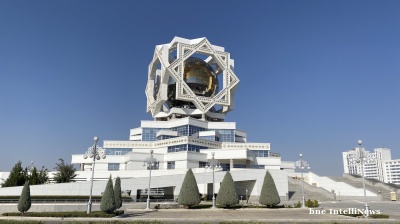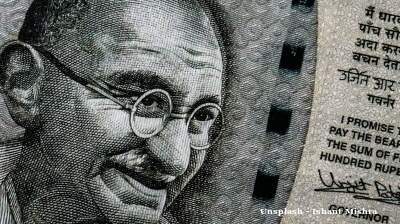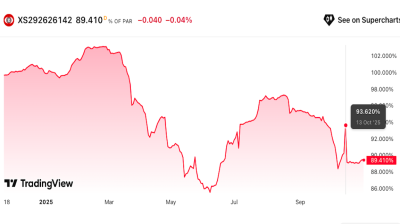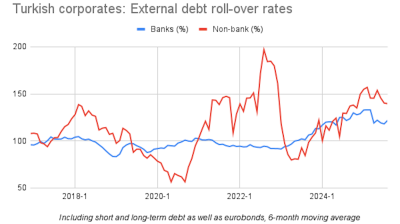Russia is going through a retail investment revolution. Plunging interest rates at bank deposits – long the favoured store of wealth for the average person – have led to a boom in Russians investing into equities. And tired of seeing their savings regularly hammered by the volatile ruble, investing in foreign stocks, denominated in dollars, has ballooned in the last two years.
All this is possible thanks to a confluence of factors. Russia’s leading banks have begun to focus on retail investments, made easy by the burgeoning fintech explosion where Russia is a world trendsetter. The financial market reforms a decade ago mean Russia’s capital markets are hooked seamlessly into the international capital markets. And most importantly, the St Petersburg-based SPB Exchange has built a unique system that allows punters to register an account in a minute and immediately buy and sell US, and other international stock, even when those markets are closed for trading.
Trading on SBP Exchange has ballooned in the last two years and equity daily trade volumes are now bigger than those on the better-known rival the Moscow Exchange (MOEX), which also since last summer has offered retail investors access to internationally listed stocks. There are many differences between the two exchanges, but the key one is that investors can buy these stocks on SPB Exchange using dollars, but MOEX only accepts rubles, adding another layer of FX risk to investments.
Volumes balloon
The explosion of investments into equities in general, not just foreign listed shares, has been brought about by nearly seven years of consecutive rate cuts by the Central Bank of Russia (CBR) that have brought interest rates down to post-Soviet record lows. The CBR hiked rates to 17% in 2014 during an oil price shock that caused a deep devaluation in the ruble, but since then it has cut rates several times, bringing them down to 4.25% at the start of this year. Inflation also fell to record lows of 2.3% in 2019, before starting to rise again more recently, but that meant the real rate of returns on bank deposits fell from whole percentage points into mere tens of basis points and Russian savers began to look around for almost the first time for a better investment that paid a bigger return.
The SPB Exchange has been around for more than a decade, but it has really only come into its own in the last 18 months and only just begun to earn a profit as the traded volumes took off.
Last year the total volume of traded international shares on SPB Exchange was $167bn vs MOEX's reported RUB86bn ($1.17bn), according to MOEX Annual Report. In this July alone there were $31.38bn foreign stocks and depositary receipts traded on SPB Exchange against $27.25bn of stocks, depositary receipts and investment funds traded on MOEX.
The coronavirus (COVID-19) pandemic has been a catalyst to growth of the business but also did not lead to a sell-off during the worst of last year’s crisis in April.
Trading volumes continued to rise this year even as daily life returned to normal post-COVID in Russia. Total trading volume reached approximately $206bn in 1H21, an increase of 356% from approximately $45bn in the six months ending June 30, 2020.
Almost all of the turnover on SPB Exchange is in foreign listed stocks and as a result it works long hours to overlap with the international markets: trading is possible 19 hours a day from 7:00am in the morning to 1:45 am at night Moscow time. Between 7am and 2:30pm, when the US markets are closed, the trading on the exchange relies on its own pool of investors, but after that trades can be settled on the US changes if needed.
 “People can trade when they want to,” SPB Exchange’s founder and CEO Roman Goryunov told bne IntelliNews in an exclusive interview in July. “The time difference means that the US markets only open in the late afternoon in Russia, and people don't want to trade only at the end of the day.” SPB Exchange’s tech backbone processed 1.5mn transactions a day with a daily average turnover of over $1.6bn in 1H21, and has the capacity to support a volume increase.
“People can trade when they want to,” SPB Exchange’s founder and CEO Roman Goryunov told bne IntelliNews in an exclusive interview in July. “The time difference means that the US markets only open in the late afternoon in Russia, and people don't want to trade only at the end of the day.” SPB Exchange’s tech backbone processed 1.5mn transactions a day with a daily average turnover of over $1.6bn in 1H21, and has the capacity to support a volume increase.
Origins
The building of the SPB Exchange platform has been a long time in the making. Founded in 1997, SPB Exchange first focused on the derivatives market, but subsequently sold that business and shifted its focus to organising trading in international securities. By 2014, it became possible to purchase 55 shares of the S&P 500 on the exchange and since then, the number constantly increased to the 1,800-plus stocks available today.
“SPB Exchange system makes buying stocks listed in the US for a Russian national simple. The whole process of registering an account on a brokerage side can be done with a phone and takes only a few minutes, as it is based on the government’s system for identifying individuals,” says Goryunov. “The difficulties a Russian passport holder needs to go through to register a brokerage account based in the US, even a retail account [are] Byzantine, to the point it is almost impossible,” adding the exchange now sees more than 25,000 accounts being opened daily.
“It’s snowballing,” explains Goryunov simply.
And the growth potential is huge. At the moment, about 7.6% of Russia’s adult population has a brokerage account, but only 1.6% actively use this account – far less than in other countries like the US, China and most EU countries. Bank deposits still account for about half of all savings, and investment into Russian stocks has grown to 31% in recent years, with another 7% invested into government bonds and 3% into mutual funds (known as PIFs in Russian). But investment into foreign stocks is the fastest growing segment and already accounts for more than 13% of the average retail portfolio, says Goryunov.
The financial literacy of the Russian retail investors has grown fast. The CBR has long complained about the low level of the average Russians’ financial literacy that never really got past “bank deposit” as a wealth store. Goryunov says that things like social media have created a global trend that is driving individuals to actively play markets.
“It’s like the Robinhood phenomena. Direct retail investment is exploding around the world as people gain the tools to do it,” says Goryunov. “They invest into simple strategies linked to life around them. And the lockdown catalysed that. They buy Apple as they use the phone, Zoom because that’s how they talk to the family, and Tesla as they understand the Climate Crisis is a problem. They are buying into the real things that affect people’s daily lives. It's a simple and understandable strategy. You don’t need a huge body of knowledge for this.” The coronavirus (COVID-19) pandemic has pushed the business along, but maybe surprisingly when the shocks hit the Russian economy last summer it didn't lead to a big sell-off by Russians, who are showing themselves to be long-term investors, not day traders.
“In March 2020 there was no panic selling, no fire sale. People held on to their positions. And in November, when the crisis was “over”, some investors fixed profits from investment into the crisis stocks (things like Netflix) and we saw a massive rotation back into “business as usual” equities,” says Goryunov, exactly the same rotation that professional investors made – the biggest in history.
If anything, the oil shock and associated devaluation only heightened the demand for foreign stocks that provide some protection from the volatility of the oil-price dependent ruble. 2020 will almost certainly go down in the annuals as the watershed year for retail investment.
The deep end of the liquidity pool
One of the big appeals of SPB Exchange is that Russian investors can buy and sell US listed blue chips when the US market is closed. Goryunov emphasises repeatedly that the goal of the exchange has been to create a large liquid pool to sustain trading so that if an investor wants to fix profits or add to position there is always a counterparty with whom to trade. That could be another Russian investor trading on SPB Exchange, or it could be buying from the US markets directly, depending on the price and the time of day.
The growing pool of retail investors solves the exchanges' main problems: despite being open until well into the night in Russia, it is still in the wrong time zone. The US markets open late in the afternoon Russian time and close when most people have already gone to bed.
At the same time, the Exchange has discouraged high frequency traders (HFT), so the market makers add to the pool of liquidity rather than drive up the prices.
“A significant contribution to the growth of SPB Exchange’s liquidity is made by high-frequency traders, who can only act as market makers that create liquidity. Thus we have created an environment where market makers can set thin bid-offer spreads, and therefore provide better prices for investors and traders,” says Goryunov. “We determine whether a participant on our platform qualifies as a liquidity provider. Market makers on our platform are not compelled to place orders with large spreads to prevent their spreads from being affected by a large number of trades in a short period of time, due to HFT activity.”
The fact that most of the trading is small orders of typically around $1,000 means that the fine-grain nature of these small trades also gives the market makers a more visible view of prices and allows them to offer deals with narrower spreads to boost the volumes of the trading: everyone's a winner.
“It’s a way for SPB Exchange to ensure deep liquidity, as well as push market players to compete on price rather than on speed,” says Goryunov. The liquidity pool has been further enhanced by tying up with almost all the leading banks and brokerages working in Russia: SPB Exchange is partners with 46 leading brokerages, including all the top names, and 13 of Russia’s largest banks that between them have millions of customers. Most of these have been investing heavily into fintech solutions that include stock investments and none more than Tinkoff Bank, Russia’s only purely online bank. Its investment arm, Tinkoff Investments, is the biggest player in Russia’s retail equity business.
“We have developed fintech solutions that provide new services to our customers that are part of our focus on creating liquidity,” says Goryunov.
The attitude of banks to the stock market has also changed as interest rates come down. In the past they saw the capital market as a competitor that was trying to steal their deposits – most banks’ main source of funding – but now the leading banks see stock investments as a new source of revenues.
There is no stopping the outflows now interest rates are falling, but equity investments are now pulling in money that was not previously in the banking system at all: typically, Russians keep some of their savings at home in cash, usually in dollars, for emergencies – the so-called “mattress money.” “Last year the volume of money that went into stocks was greater than the amount of money withdrawn from bank deposits,” says Goryunov. “That means not only are the people changing the way they invest their wealth, but stocks are also tapping into a new pool of money that has never been in the banking system.” Part of SPB Exchange’s success has been fuelled by the explosion of online business and in particular the use of fintech solutions by Russia, which has in many respects led the West in the use of financial services provided online.
Russia’s banks are rolling out more and more services as the banking business is being transformed, led by Tinkoff Invest, which is already bigger than Russia’s retail banking behemoth Sber (formerly known as Sberbank) that holds half of all the retail deposits in the entire country.
“SPB Exchange utilises a B2B2C model,” says Goryunov. “Main clients of most banks come to us including all the major financial institutions that service retail investors. SPB Exchange’s direct customers are brokerages working with retail investors. SPB Exchange is focusing on targeting brokerages that cater to retail investors, including the industry’s top names such as Tinkoff Investments, and demand for their services is growing. For the Russian market overall, net purchases of securities by retail investors reached RUB491bn ($6.7bn) in the first quarter, more than double the volume of net purchases for 2020, according to CBR data,” Goryunov adds.
IPO and results
Until 2020 SPB Exchange was not making any profit, ploughing everything that came in since 2014 years back into development. But that has all changed now as the retail investor revolution gets underway.
“The past few years the revenue has been rising, but it has not happened overnight,” says Goryunov. “We have been building the system and it has been a lengthy process, but now we are realising the potential of all the work we have put in.”
|
SPB Exchange results |
||
|
Indicators |
2020 |
2019 |
|
Revenue |
360.40% |
13.70% |
|
Operational Profit |
545.30% |
23.00% |
|
EBT |
163581.30% |
-96.40% |
|
Net Profit |
21278.50% |
-84.40% |
|
FCF |
1319.00% |
-165.40% |
|
Source: Seeking Alpha |
||
The exchange plans to IPO in the near future, according to local press reports, and will come to market with dramatically improving results. It makes two thirds of its money from fees associated with clearing and settlement and then another quarter from stock market business fees, but part of the business model is to keep the cost of fees down and make a profit on the volumes.
Total revenue increased 4.6x in 2020, driven by growth in SPB Exchange’s customer base and trading volumes. Similar dynamics will continue this year, with revenue expanding 4.5x in 1Q 2021 year on year vs 1Q 2020, the exchange said when reporting its first results.
SPB Exchange also makes a little money from its subsidiary company that provides depository brokerage activities, Best Efforts Bank.
That is another reason for tapping the retail pool, and as Russian retail investors switch out of bank deposits and into stocks SPB Exchange’s business has been flourishing.
SPB Exchange gets commission both from buyers and from sellers if the internal liquidity pool is chosen. However, if “smart order routing” is used, meaning the external liquidity pool is automatically chosen as the best-priced one, “SPB Exchange gets a smaller profit margin, taking the commission from either seller or buyer,” Goryunov says.
Even with “smart order routing” in place, over 77% of all trades were completed internally (without tapping into external liquidity pools like the Nasdaq) in the six months ended June 30, 2021.
Exchange is open 7:00am to 1:45 am Moscow time five days a week, providing longer trading hours than MOEX while US markets are closed, and covering its premarket and postmarket slots. In the medium term, SPB Exchange aims to extend its trading hours even further.
BOX – 2011 capital market revolution
It is hard to overestimate the size of the revolution that was Russia’s 2011 capital market reforms. Goryunov was head of RTS at the time and intimately involved in the merger with MICEX to unite Russia’s two biggest platforms, which were then hooked directly into the international capital market system by tying up with Clearstream. At the stroke of a pen the new system allowed international investors to buy and sell Russian stocks and bonds directly from their terminals in London and New York.
The whole structure of the market was transformed: the two main exchanges – the ruble-denominated Moscow Interbank Currency Exchange (MICEX) and the dollar-denominated Russia Trading System (RTS) – were merged and a central depository (CSD) was set up in the form of the National Depository Company (NDC) to clear and settle the trades. That was then linked to the international markets via ClearStream to do the international settlement and clearing of trades. These changes opened Russia’s capital markets to the global pool of capital and brought in an extra $20bn very rapidly, mostly into the local Russian Ministry of Finance rouble-denominated OFZ treasury bond market that became an important new source of funding for the Russian budget.
It also radically changed the shape of the market. The leading brokerages, household names that made buckets of money facilitating international investments into Russia’s booming and crashing stock market, were almost all killed off.
About half of investments into Russia’s equities are from foreign investors who had opened brokerage accounts with the likes of Renaissance Capital, Troika Dialog, Aton, UFG Capital and others, to transact their investments. In what turned out to be his swansong speech at Renaissance Capital’s annual investment summit that year, owner Stephen Jennings said that the reforms were going to create a “barbell” in the market: big state-owned banks at one fat end and small niche players at the other end. Everything in the middle would suffer or die.
Jennings was right, except he assumed that RenCap would be one of the survivors. It wasn't. From being a powerhouse on the Russian capital markets for nearly two decades its business has atrophied dramatically and today it concentrates more on its African business it set up almost two decades ago. Troika Dialog was sold to Sberbank and forms the core of what is now Sberbank CIB, the retail giant’s investment banking arm. Deutsche Bank’s investment bank business was sold lock, stock and barrel to the state-owned VTB in 2008 to create VTB Capital (VTBC), its investment banking arm. (To this day VTBC’s morning investment monitors still use the naming protocols set up by Deutsche Bank for their pdfs.) The state banks survived because in addition to the international business they also have access to billions in cash of the biggest state-owned companies that also need the capital markets to fund their businesses.
What SPB Exchange has done is tap the other end of the barbell: Russia’s retail investors. Until last year, this pool of liquidity has never been big, despite several efforts to make it grow. President Boris Yeltsin got the ball rolling in 1997 when he created the PIFs (mutual investment funds) and legendary investor Mark Mobius arrived in Moscow with his Franklin Templeton in what everyone hoped would become a financial bonanza. The RTS soared in 1997 in a stock market boom. Less than a year later the market was all but destroyed by the collapse and default on Russia’s GKO market, the precursor to the OFZs, and a deep devaluation that reduced the ruble’s value by three quarters overnight.
SPB Exchange has also capitalised on another quirk of the 2011 reform. The goal of those changes was to bring trading onshore to the Russian exchanges. Since then, Moscow Exchange (MOEX) has focused on moving trading to its exchange and winding down the American and Global Depository Receipt programmes (ADR and GDR respectively), which are a proxy for local shares that are listed on international exchanges. These instruments usually trade at a slight premium to the underlying shares so investors could make easy money by buying the GDRs and swapping them for their underlying shares by moving their ownership from the international custodians to the local one, banking the difference in their respective values.
The reform has been a huge success. In 2011 the majority of investment into Russian stocks was held in the international financial capitals of London and New York, but today it’s mostly all in Russia. At the same time, there has been a continuous trend of Russian IPOs that are now dual-listed in Moscow and either New York or London, but increasingly companies are choosing to only list in Moscow. The exception is things like tech companies, where the pool of tech investors on NASDAQ is so big it makes more sense to list in the US (or at least dual-list) than in Moscow.
As the 2011 reform was aimed at bringing trading onshore, all the trading on MOEX is denominated in rubles. What SPB Exchange has done is build a platform where retail investors can buy foreign stocks using dollars and so cut out the FX risk completely, something that MOEX can’t offer, even though it has offered clients the ability to buy foreign shares since last year.
“The merger of RTS bourse and MICEX bourse into MOEX (Moscow Exchange) was designed to bring the trading of Russian stocks back to Russia. The usage of rubles is hardwired into the MOEX IT system. It is not possible to buy the stocks directly in dollars,” says Goryunov. “That exposes the investor to FX risk, as in addition to the movement in the value of the stock you also have to calculate the changes to the value of the currency.” SPB Exchange accounts for 50% of total value traded of stocks and depositary receipts in Russia, according to the CBR as of the first quarter of this year.
The ability to buy international stocks has opened up a much bigger pool of stocks to investors: MOEX has been getting into the foreign stocks game and currently offers 204 names, but 1,817 international securities were traded on SPB Exchange’s exchange as of June 30, 2021 – nine times more than MOEX. Still, the classic FAANG stocks (Facebook, Amazon, Apple, Netflix and Google) dominate the business and are as popular with Russian investors as they are Stateside.
|
Exchange activity |
||
|
Stock Market |
SPB Exchange |
Moscow Exchange |
|
Trading volume 2020 |
$167.29bn |
$64bn |
|
Change |
999,94% |
34.70% |
|
July volume |
$31.38bn |
$27.08bn |
|
Daily average July volume |
$1.43bn |
$1.23bn |
|
Change |
111.81% |
31.10% |
|
Source: Seeking Alpha |
||
Features

COMMENT: For Asia, dealing with Europe isn’t about achieving success; it’s about concealing failure
To be taken seriously in Asia, Europe must rediscover the courage to deliver, not merely declare. Asia has moved on to execution. Europe is still editing its initial policy draft.

Washington has a new focus on a Caspian energy play
For most of the last three decades since winning independence, Central Asia has been a bit of a backwater. Not any more. The Trump administration is becoming more focused on Turkmenistan's vast gas reserves and can smell money and power there.

BOTAŞ and Turkey’s hub ambition: from “30-year dream” to cross-border reality
For Ankara, the symbolism is as important as the molecules: Turkey’s energy map is shifting from end-market to hub.





